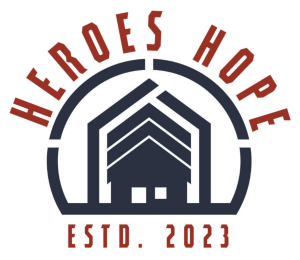 I can remember the moment that Haili and I knew we were supposed to start Heroes Hope. We had spent a couple of years looking for an organization that was passionate about veterans, understood the veteran community, and had an open-door policy for meeting veterans’ needs. Time and time again, we heard stories—and experienced ourselves—the feeling that we (as veterans) didn’t connect with those around us and that nobody truly understood us.
I can remember the moment that Haili and I knew we were supposed to start Heroes Hope. We had spent a couple of years looking for an organization that was passionate about veterans, understood the veteran community, and had an open-door policy for meeting veterans’ needs. Time and time again, we heard stories—and experienced ourselves—the feeling that we (as veterans) didn’t connect with those around us and that nobody truly understood us.
Meanwhile, so many men and women we met were struggling with post-traumatic stress, injuries, trauma, traumatic brain injuries, and more. Many turned to self-medicating just to escape the pain. We became frustrated, because the problem wasn’t the veteran, or the alcohol, or even the community around them. The problem was the weight of military experiences and the struggle of returning to a world that simply doesn’t understand us. That’s when it hit us: we hadn’t found the right group yet because we were that group. And so, Heroes Hope was born.
A Simple, Radical Idea
I’m a “big idea” kind of person, and I remember asking, “What if we created a space where veterans could come, just as they are, with no barriers?” To us, it made sense. The missing piece was community—getting veterans together in a safe place and walking through the struggles together. Many incredible organizations were already hosting outings, adventures, cookouts, and other activities. The difference for us was that we wanted to go further: to get our friends off the streets, into safety, and into reliable housing as fast as possible. That’s when we coined the phrase: “no-red-tape housing and resources.” If we could verify someone was a veteran, nothing else mattered except helping them. It was simple, it was clear, and we were ready. But others weren’t.
“Impossible” Became Our Fuel
In the beginning, people told us our approach was impossible. Sure, it sounded good in theory, but many insisted that addicts loved their drug of choice too much, and that the unhoused lived that way because they wanted to. We were warned we’d be taken advantage of, drained of time, money, and resources, and eventually burned out. But that skepticism only fueled us. We knew this approach wasn’t just possible—it was necessary, and it would change lives.
From Slow Starts to First Homes
Like a train leaving the station, Heroes Hope started slow. At first, we provided care packages, water, and the occasional hotel room. But by the end of our second year, we had leased a home that became our first transitional house. I’ll never forget the first veteran we moved in. We sat at the table, talked about the house and the program.
After about 15 minutes, he stopped and asked: “So what’s this going to cost me? How much is the rent or whatever?” When I told him, “Nothing,” he was stunned. “Nothing?!” I looked him in the eye and said, “I expect nothing from you but to take one step, every day, toward the best version of yourself. While you’re here, this is your home. There will be food, water, TV, internet, and our team will be here as often as possible to help you navigate what’s next. We expect nothing, but we hope for everything.” Silence. Then tears.
Breaking Barriers with Partnerships
Fast forward to today. In addition to outreach and transitional housing, we now work alongside the Department of Veterans Affairs, local housing authorities, and other organizations to help veterans secure safe, stable, and accessible housing quickly. For years, communication and partnership were the biggest hurdles—between government entities, property owners, and veterans themselves.
In some cases, it took up to a year for veterans who qualified for housing to finally get placed. It broke our hearts. Now, after months of effort, trial, failure, and persistence, we’ve created a process that gets veterans housed in less than a month. It’s not simple, but it’s happening—and it’s changing lives. And let me be clear: we don’t just house men and women and leave them where they are. We walk alongside them, mentor them, and stand in their corner. Together, we lead them toward the version of themselves they want to be. It’s not just us or just them—it’s both, together.
The Proof
I still get asked almost daily: “Is it really possible to take a veteran from the street and house them?” Skeptics still struggle to believe it. But the proof is undeniable: we’ve done it for over 60 men and women since we started—and we’re not slowing down. This is only the beginning. My hope is that our story inspires you to do something similar in your own community.
Join the Cause
The reality is, Heroes Hope cannot—and will not—end veteran homelessness alone. But together, we can overcome any challenge. Together, we can change the lives of veterans in every city across our country.
So, will you join the cause? Heroes Hope Team Request
